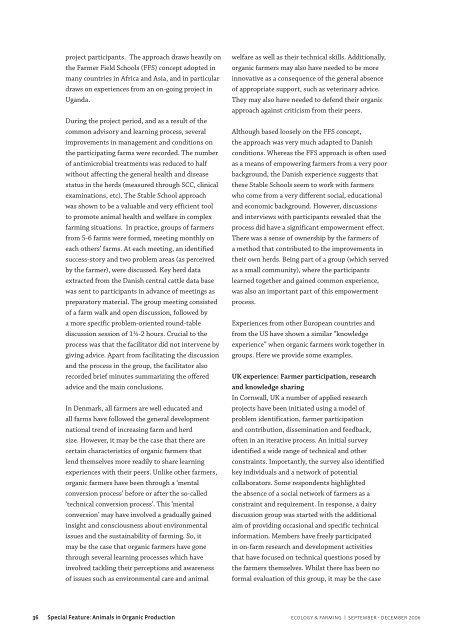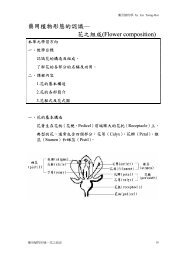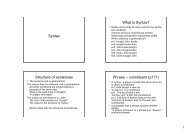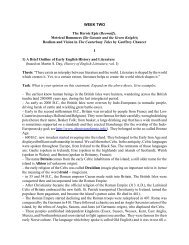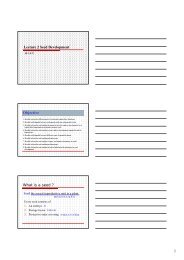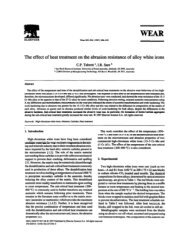Ecology and Farming
Ecology and Farming
Ecology and Farming
You also want an ePaper? Increase the reach of your titles
YUMPU automatically turns print PDFs into web optimized ePapers that Google loves.
project participants. The approach draws heavily on<br />
the Farmer Field Schools (FFS) concept adopted in<br />
many countries in Africa <strong>and</strong> Asia, <strong>and</strong> in particular<br />
draws on experiences from an on-going project in<br />
Ug<strong>and</strong>a.<br />
During the project period, <strong>and</strong> as a result of the<br />
common advisory <strong>and</strong> learning process, several<br />
improvements in management <strong>and</strong> conditions on<br />
the participating farms were recorded. The number<br />
of antimicrobial treatments was reduced to half<br />
without affecting the general health <strong>and</strong> disease<br />
status in the herds (measured through SCC, clinical<br />
examinations, etc). The Stable School approach<br />
was shown to be a valuable <strong>and</strong> very efficient tool<br />
to promote animal health <strong>and</strong> welfare in complex<br />
farming situations. In practice, groups of farmers<br />
from 5-6 farms were formed, meeting monthly on<br />
each others’ farms. At each meeting, an identified<br />
success-story <strong>and</strong> two problem areas (as perceived<br />
by the farmer), were discussed. Key herd data<br />
extracted from the Danish central cattle data base<br />
was sent to participants in advance of meetings as<br />
preparatory material. The group meeting consisted<br />
of a farm walk <strong>and</strong> open discussion, followed by<br />
a more specific problem-oriented round-table<br />
discussion session of 1½-2 hours. Crucial to the<br />
process was that the facilitator did not intervene by<br />
giving advice. Apart from facilitating the discussion<br />
<strong>and</strong> the process in the group, the facilitator also<br />
recorded brief minutes summarizing the offered<br />
advice <strong>and</strong> the main conclusions.<br />
In Denmark, all farmers are well educated <strong>and</strong><br />
all farms have followed the general development<br />
national trend of increasing farm <strong>and</strong> herd<br />
size. However, it may be the case that there are<br />
certain characteristics of organic farmers that<br />
lend themselves more readily to share learning<br />
experiences with their peers. Unlike other farmers,<br />
organic farmers have been through a ‘mental<br />
conversion process’ before or after the so-called<br />
‘technical conversion process’. This ‘mental<br />
conversion’ may have involved a gradually gained<br />
insight <strong>and</strong> consciousness about environmental<br />
issues <strong>and</strong> the sustainability of farming. So, it<br />
may be the case that organic farmers have gone<br />
through several learning processes which have<br />
involved tackling their perceptions <strong>and</strong> awareness<br />
of issues such as environmental care <strong>and</strong> animal<br />
welfare as well as their technical skills. Additionally,<br />
organic farmers may also have needed to be more<br />
innovative as a consequence of the general absence<br />
of appropriate support, such as veterinary advice.<br />
They may also have needed to defend their organic<br />
approach against criticism from their peers.<br />
Although based loosely on the FFS concept,<br />
the approach was very much adapted to Danish<br />
conditions. Whereas the FFS approach is often used<br />
as a means of empowering farmers from a very poor<br />
background, the Danish experience suggests that<br />
these Stable Schools seem to work with farmers<br />
who come from a very different social, educational<br />
<strong>and</strong> economic background. However, discussions<br />
<strong>and</strong> interviews with participants revealed that the<br />
process did have a significant empowerment effect.<br />
There was a sense of ownership by the farmers of<br />
a method that contributed to the improvements in<br />
their own herds. Being part of a group (which served<br />
as a small community), where the participants<br />
learned together <strong>and</strong> gained common experience,<br />
was also an important part of this empowerment<br />
process.<br />
Experiences from other European countries <strong>and</strong><br />
from the US have shown a similar “knowledge<br />
experience” when organic farmers work together in<br />
groups. Here we provide some examples.<br />
UK experience: Farmer participation, research<br />
<strong>and</strong> knowledge sharing<br />
In Cornwall, UK a number of applied research<br />
projects have been initiated using a model of<br />
problem identification, farmer participation<br />
<strong>and</strong> contribution, dissemination <strong>and</strong> feedback,<br />
often in an iterative process. An initial survey<br />
identified a wide range of technical <strong>and</strong> other<br />
constraints. Importantly, the survey also identified<br />
key individuals <strong>and</strong> a network of potential<br />
collaborators. Some respondents highlighted<br />
the absence of a social network of farmers as a<br />
constraint <strong>and</strong> requirement. In response, a dairy<br />
discussion group was started with the additional<br />
aim of providing occasional <strong>and</strong> specific technical<br />
information. Members have freely participated<br />
in on-farm research <strong>and</strong> development activities<br />
that have focused on technical questions posed by<br />
the farmers themselves. Whilst there has been no<br />
formal evaluation of this group, it may be the case<br />
3 Special Feature: Animals in Organic Production <strong>Ecology</strong> & <strong>Farming</strong> | SEptEmbEr - DEcEmbEr 2006


